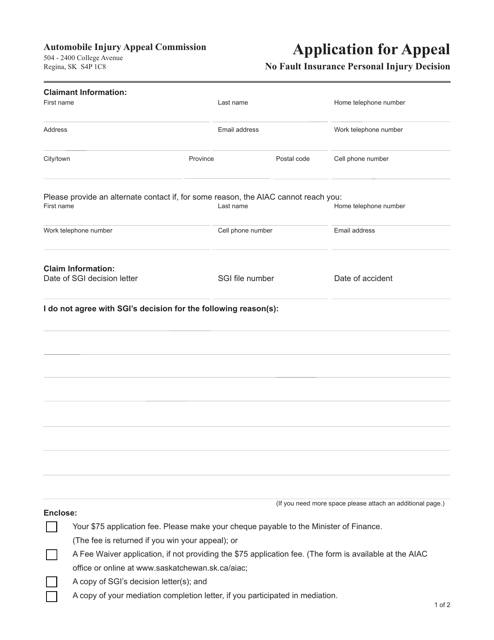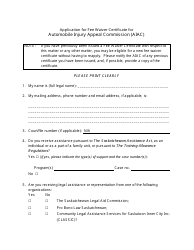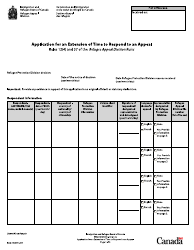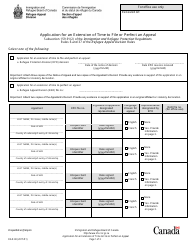Application for Appeal No Fault Insurance Personal Injury Decision - Saskatchewan, Canada
The Application for Appeal No Fault Insurance Personal Injury Decision in Saskatchewan, Canada is used for appealing a decision related to personal injury under the no-fault insurance system in the province.
In Saskatchewan, Canada, the application for appeal of a no-fault insurance personal injury decision is filed by the injured person or their legal representative.
FAQ
Q: What is an Appeal No Fault Insurance Personal Injury Decision?
A: An Appeal No Fault Insurance Personal Injury Decision is a process to challenge a decision made by an insurance provider regarding a personal injury claim in Saskatchewan, Canada.
Q: Who can apply for an Appeal No Fault Insurance Personal Injury Decision?
A: Any individual who is dissatisfied with a decision made by an insurance provider regarding a personal injury claim can apply for an Appeal No Fault Insurance Personal Injury Decision.
Q: How can I apply for an Appeal No Fault Insurance Personal Injury Decision?
A: To apply for an Appeal No Fault Insurance Personal Injury Decision, you need to complete the necessary forms and submit them to the appropriate authority in Saskatchewan, Canada.
Q: What are the grounds for filing an appeal?
A: Grounds for filing an appeal may include errors of law, errors in the interpretation of evidence, or procedural irregularities.
Q: What happens after I file an appeal?
A: After you file an appeal, your case will be reviewed by an independent authority or tribunal. They will assess the evidence and make a decision based on the merits of your case.
Q: Is there a time limit for applying for an appeal?
A: Yes, there is usually a time limit for applying for an appeal. It is important to check the specific rules and regulations in Saskatchewan, Canada.
Q: What is the outcome of an Appeal No Fault Insurance Personal Injury Decision?
A: The outcome of an Appeal No Fault Insurance Personal Injury Decision can vary. The decision may uphold the original decision, overturn it, or modify it in some way.
Q: Can I seek legal representation for an appeal?
A: Yes, you have the right to seek legal representation for an appeal. It is advisable to consult with a lawyer who specializes in personal injury law to guide you through the process.
Q: Are there any fees associated with filing an appeal?
A: There may be fees associated with filing an appeal. It is important to review the fee structure and any applicable costs before submitting your appeal.
Q: What should I do if my appeal is unsuccessful?
A: If your appeal is unsuccessful, you may have alternative options available, such as seeking further legal advice or exploring other avenues of recourse.
Q: Can I file an appeal for a personal injury decision in other provinces?
A: The process for filing an appeal for a personal injury decision may vary in different provinces. It is best to consult the specific regulations and procedures of the province where the decision was made.
Q: Is the appeal process the same for all types of personal injury claims?
A: The appeal process may vary depending on the nature of the personal injury claim. It is important to consult the applicable laws and regulations for the specific type of claim.
Q: What rights do I have as an applicant during the appeal process?
A: As an applicant during the appeal process, you have the right to present your case, provide evidence, and have the opportunity to be heard.
Q: Can I withdraw my appeal at any time?
A: Yes, you can generally withdraw your appeal at any time. However, it is advisable to consult with a legal professional before making that decision.
Q: What should I do if I need assistance with the appeal process?
A: If you need assistance with the appeal process, you can reach out to legal aid services, community organizations, or seek guidance from a lawyer.
Q: Can the decision made during the appeal process be further appealed?
A: In some cases, the decision made during the appeal process can be further appealed to a higher court or tribunal. It is best to consult with a legal professional to understand the options available to you.
Q: Is there a deadline for receiving a decision on the appeal?
A: The timeframe for receiving a decision on the appeal can vary. It depends on the complexity of the case and the workload of the reviewing authority or tribunal.
Q: Can the decision made in the appeal be binding?
A: Yes, the decision made in the appeal can be binding, meaning it must be followed and implemented by the parties involved.
Q: What is the role of an independent authority or tribunal in the appeal process?
A: The role of an independent authority or tribunal in the appeal process is to review the case impartially, assess the evidence, and make a fair and unbiased decision based on the facts presented.
Q: What types of evidence should I provide for my appeal?
A: You should provide any relevant evidence that supports your case, such as medical records, witness statements, expert opinions, or any other documentation that can help in proving your claim.
Q: Can I represent myself during the appeal process?
A: Yes, you have the right to represent yourself during the appeal process. However, it is advisable to seek legal advice to ensure you understand the legal procedures and have the best chance of success.
Q: Can an appeal be resolved through mediation or settlement?
A: Yes, an appeal can be resolved through mediation or settlement if both parties agree to pursue those options. It is important to explore all possibilities before proceeding with a formal appeal.
Q: What is the purpose of an appeal in a no-fault insurance system?
A: The purpose of an appeal in a no-fault insurance system is to provide a mechanism for individuals to challenge and seek a fair resolution for their personal injury claims.
Q: Is there a specific form to use for filing an appeal?
A: Yes, there is usually a specific form to use for filing an appeal. It is important to obtain the correct form and fill it out accurately.
Q: Can I submit new evidence during the appeal process?
A: In some cases, you may be allowed to submit new evidence during the appeal process if it is considered relevant and necessary to support your case.
Q: What should I do if I have concerns about the appeal decision?
A: If you have concerns about the appeal decision, you may have the option to seek legal advice or explore further avenues of recourse, depending on the specific circumstances.
Q: Who will review my appeal?
A: Your appeal will be reviewed by an independent authority or tribunal appointed for this purpose.
Q: What is the deadline for submitting an appeal?
A: The deadline for submitting an appeal may vary depending on the specific regulations and procedures in Saskatchewan, Canada. It is important to check the applicable time limits.
Q: Can I apply for an appeal if I have already received compensation from my insurance provider?
A: The ability to apply for an appeal after receiving compensation from your insurance provider may depend on the specific circumstances and the terms of the settlement. It is advisable to consult with a legal professional for personalized advice.
Q: Can I submit additional information to support my appeal?
A: Yes, you can generally submit additional information to support your appeal. It is important to provide any relevant evidence and arguments that strengthen your case.
Q: Is there a fee for obtaining a copy of the appeal decision?
A: There may be a fee associated with obtaining a copy of the appeal decision. It is advisable to inquire about any applicable fees before making a request.
Q: What legal rights do I have during the appeal process?
A: During the appeal process, you have the right to due process, fair treatment, and a reasonable opportunity to present your case and evidence.
Q: Can I apply for an appeal if I disagree with the amount of compensation awarded?
A: Yes, you can apply for an appeal if you disagree with the amount of compensation awarded. The appeal process provides an opportunity to challenge and seek a different outcome.
Q: What is the time frame for the appeal process?
A: The time frame for the appeal process can vary. It depends on factors such as the complexity of the case, the availability of resources, and the workload of the reviewing authority or tribunal.
Q: Can I request an extension for submitting my appeal?
A: In certain circumstances, you may be able to request an extension for submitting your appeal. It is advisable to provide valid reasons for the request and follow the established procedures.
Q: Can I apply for an appeal if my personal injury claim was denied?
A: Yes, you can apply for an appeal if your personal injury claim was denied. The appeal process allows for a review and reconsideration of the initial decision.
Q: What is the governing body that oversees the appeal process?
A: The governing body that oversees the appeal process may vary depending on the specific regulations and procedures in Saskatchewan, Canada. It is important to refer to the relevant authorities for guidance.
Q: Can I withdraw my appeal after a decision has been made?
A: In general, it is not possible to withdraw your appeal after a decision has been made. However, it is advisable to consult with a legal professional for personalized advice.
Q: Is there a specific time limit for the appeal decision to be made?
A: The specific time limit for the appeal decision to be made may vary. It depends on various factors, including the workload of the reviewing authority or tribunal and the complexity of the case.
Q: Can I apply for an appeal for someone else?
A: In most cases, you cannot apply for an appeal on behalf of someone else. An individual must usually apply for an appeal themselves.
Q: Can the appeal decision be based on new evidence?
A: The appeal decision may consider new evidence if it is deemed relevant and necessary to the case. However, the specific rules regarding new evidence may vary.
Q: Can the appeal be resolved without going to court?
A: Yes, the appeal can be resolved without going to court through alternative dispute resolution methods such as mediation or settlement discussions.
Q: What is the standard of review in the appeal process?
A: The standard of review in the appeal process may vary. It depends on the specific regulations and procedures governing the appeal.
Q: Can I request a copy of the appeal decision?
A: Yes, you can generally request a copy of the appeal decision. It is advisable to follow the established procedures and inquire about any applicable fees.
Q: What happens if I miss the deadline for submitting an appeal?
A: If you miss the deadline for submitting an appeal, you may lose the opportunity to challenge the decision. It is important to adhere to the specified time limits.
Q: Can I request a reconsideration of the appeal decision?
A: In some cases, you may be able to request a reconsideration of the appeal decision. It is advisable to consult with a legal professional to understand the options available to you.
Q: What is the expected timeline for receiving a decision on the appeal?
A: The expected timeline for receiving a decision on the appeal may vary. It depends on various factors, including the complexity of the case and the workload of the reviewing authority or tribunal.
Q: Can I use the appeal process to challenge the liability determination?
A: Yes, you can use the appeal process to challenge the liability determination made by the insurance provider.
Q: Are there any limitations on the types of injuries that can be appealed?
A: There may be limitations on the types of injuries that can be appealed. It is advisable to consult the specific regulations and procedures for the applicable limitations.
Q: Can I request oral arguments during the appeal process?
A: In some cases, you may be able to request oral arguments during the appeal process. It is advisable to follow the established procedures and guidelines.
Q: Can I apply for an appeal if I disagree with the decision on the severity of my injuries?
A: Yes, you can apply for an appeal if you disagree with the decision on the severity of your injuries. The appeal process allows for a review and reassessment of the severity determination.
Q: What happens if the appeal decision is in my favor?
A: If the appeal decision is in your favor, it may result in a different outcome, such as increased compensation or a revised determination of liability.
Q: Can I seek compensation for legal costs incurred during the appeal process?
A: In some cases, you may be able to seek compensation for legal costs incurred during the appeal process. It is advisable to consult with a legal professional to understand the options available to you.
Q: Can I apply for an appeal if my claim was partially accepted?
A: Yes, you can apply for an appeal if your claim was partially accepted. The appeal process allows for a review and reconsideration of the decision.
Q: What should I do if I receive new information after submitting my appeal?
A: If you receive new information after submitting your appeal, it is advisable to notify the reviewing authority or tribunal as soon as possible. They will provide guidance on how to proceed.
Q: Can I apply for an appeal if my claim was settled outside the insurance system?
A: The ability to apply for an appeal after settling a claim outside the insurance system may depend on the specific circumstances and the terms of the settlement. It is advisable to consult with a legal professional for personalized advice.
Q: What happens if I disagree with the decision made in the appeal?
A: If you disagree with the decision made in the appeal, you may have the option to seek further legal advice or explore alternative avenues of recourse, depending on the specific circumstances.
Q: Can I apply for an appeal if my claim was denied due to pre-existing conditions?
A: Yes, you can apply for an appeal if your claim was denied due to pre-existing conditions. The appeal process allows for a review and reassessment of the decision based on the specific circumstances of your case.
Q: Is there a fee for filing an appeal?
A: There may be a fee for filing an appeal. It is advisable to review the fee structure and any applicable costs before submitting your appeal.
Q: Can I request an adjournment during the appeal process?
A: In certain circumstances, you may be able to request an adjournment during the appeal process. It is advisable to provide valid reasons for the request and follow the established procedures.
Q: Can the appeal decision be further appealed to a higher court?
A: In some cases, the appeal decision can be further appealed to a higher court or tribunal. It is best to consult with a legal professional to understand the options available to you.
Q: Can I apply for an appeal if I believe the compensation awarded is insufficient?
A: Yes, you can apply for an appeal if you believe the compensation awarded is insufficient. The appeal process provides an opportunity to challenge and seek a different outcome.
Q: Can the appeal decision be based on legal precedent?
A: The appeal decision may consider legal precedent if it is relevant to the case at hand. However, the specific rules regarding legal precedent may vary.
Q: What happens if I do not agree with the appeal decision?
A: If you do not agree with the appeal decision, you may have the option to seek further legal advice or explore alternative avenues of recourse, depending on the specific circumstances.







